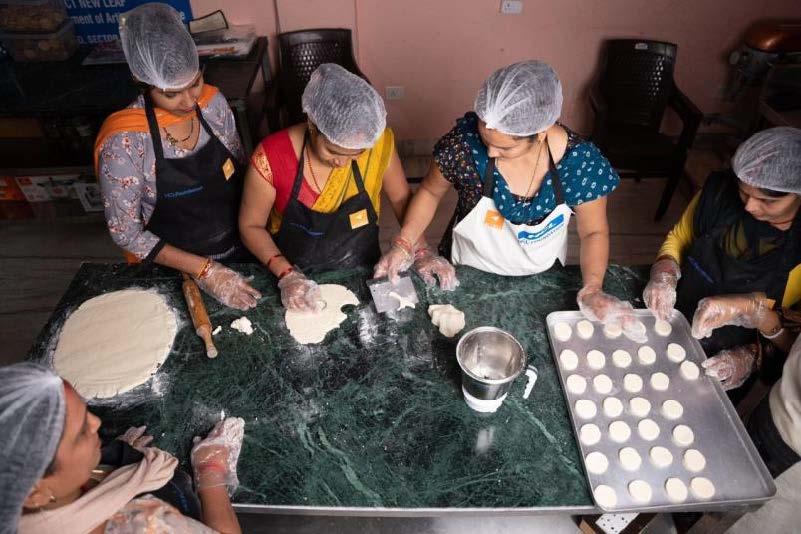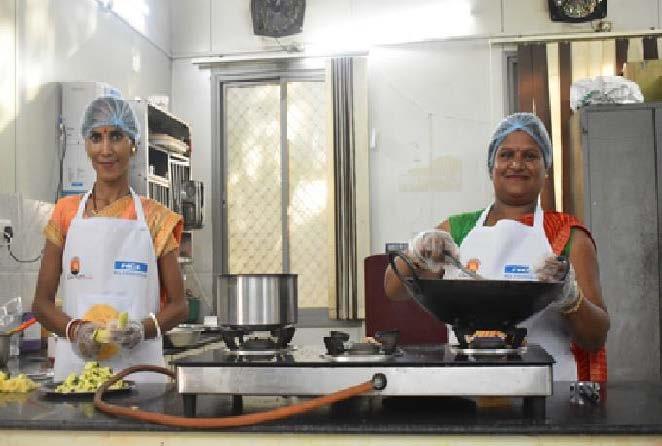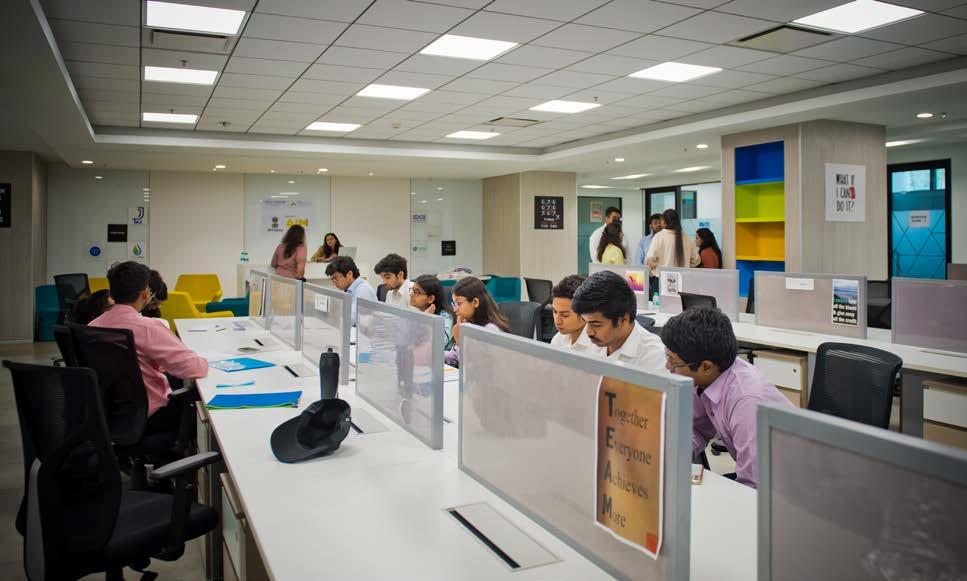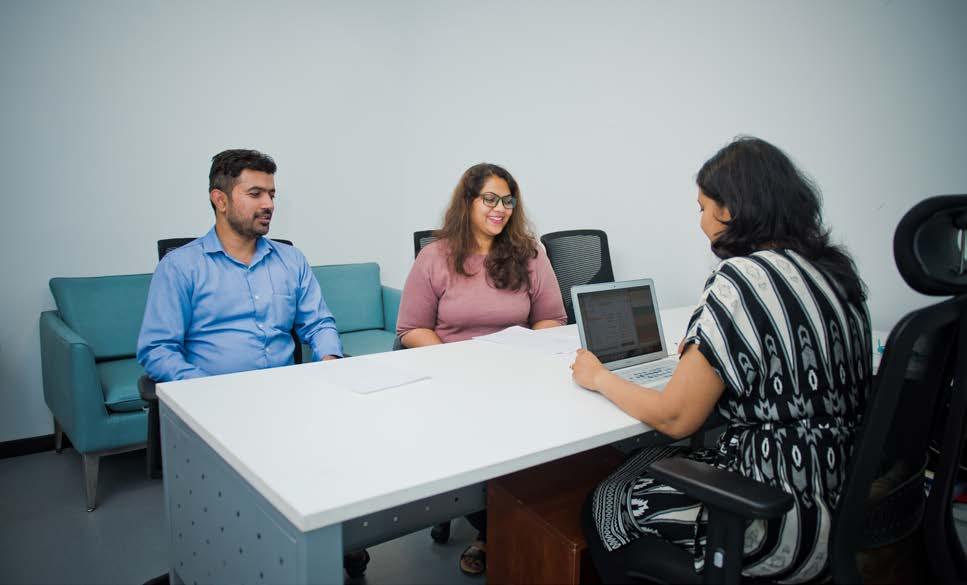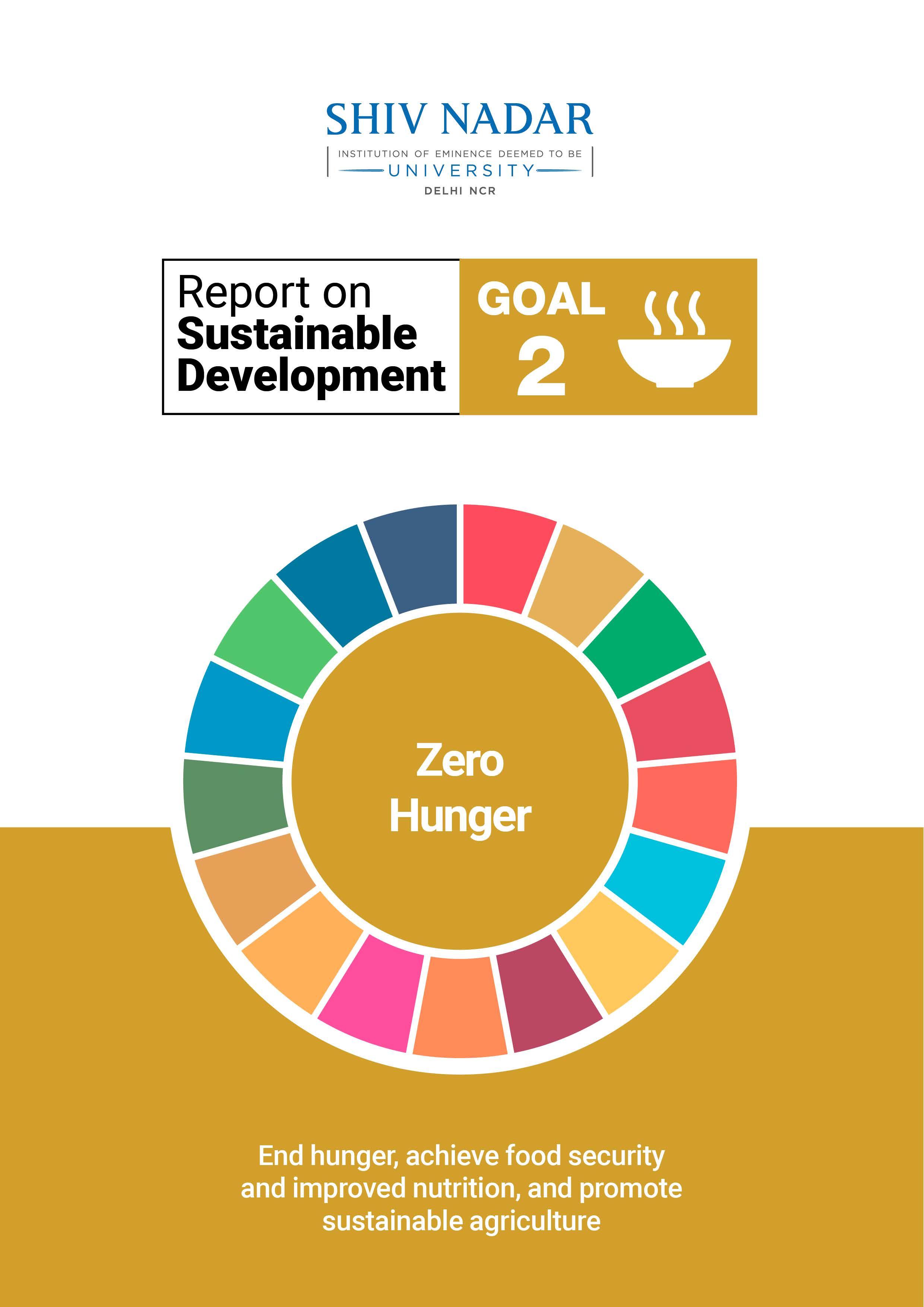


The Sustainable Development Goal of Zero Hunger has eight targets and 13 indicators that aim to address the massive problem of nearly two billion people who do not have access to safe, sufficient, and nutritious food. Even though enough food is produced today to feed the planet, hunger is rising in some parts of the world. The disparity in food distribution and the importance of addressing hunger through equitable access and systemic change calls for a holistic and multi-dimensional approach to address the issue and achieve the goal.
At Shiv Nadar University, we advance SDG 2 through teaching and research in areas around agriculture, food sustainability, hunger, and malnutrition, to name a few. We are committed to monitoring and tackling food wastage on campus and addressing hunger among students and local communities through engagement and advocacy.
Here is a glimpse of our work.
TEACHING AND LEARNING
We offer several courses to give a holistic understanding of food, Agriculture, hunger, malnutrition, and related topics. The International Relations and Governance department offers AgriFood Systems (INT 145), Agriculture Vs. Environment

Hunger is neither inevitable nor irremediable — it is within our power to bring this old affliction under control.
Binay Ranjan Sen (Indian diplomat and former FAO Director-General)
(INT 232); the Department of Sociology provides interesting courses like food, sustainability, and culture (SOC 396); and Agrarian Worlds: Readings in the Anthropology of Agriculture (SOC 213). Ecology, Water, Climate Change and Energy (RTM 106), Agriculture, Livestock and Forestry (RTM 105), Education, Health and Nutrition (RTM 107). All undergraduate students are offered a compulsory common course curriculum program on Agricultural land and water crises and responses (CCC 718).
Student Stories
Field Internships of Students of the Master’s Program in Rural Management - Forty Students, Eighteen States, and a Thousand Questions
As a significant part of their coursework, 40 students from the first batch of the MA in Rural Management program at Shiv Nadar University traveled across 18 states and partnered with eminent grassroots organizations, from Kutch to Kalahandi, Melghat to Bundelkhand, Telangana to Dantewada. Living and working in tribal hamlets, NGO field offices, remote villages, and towns, every internship project was a site of learning, challenges, and transformations. Students worked on themes around:
• Tribal land and forest rights,
• Participatory groundwater management,
• Regenerative agriculture,
• Women’s leadership in SHGs and FPOs,
• Seed biodiversity and agroecology, to name a few.


Undergraduate Student Research Projects
The flagship program on Opportunities for Undergraduate Research (OUR) enables undergraduate students to explore and undertake research projects. A group of students is working under the guidance of Dr. Gopal Das Singhal, Professor, and Dr. Hitesh Upreti, Assistant Professor, Department of Civil Engineering. These projects are using satellite remote sensing for agricultural monitoring and detecting crop water stress, which is crucial for food and water security. The study area of the projects is the farming fields located in the vicinity of our university. The project impacts SDGs 6 and 2:
1. Crop monitoring and detection of irrigation events in agricultural fields using remote sensing techniques
Chinthamaneni Sryodh is working on a project that uses satellite remote sensing to estimate the soil water content and detect the irrigation
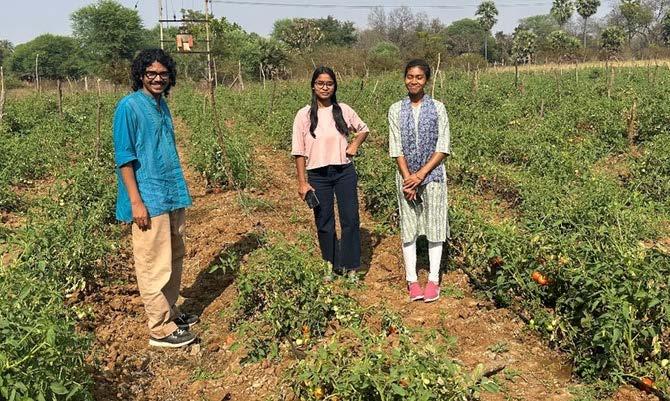
dates in the farmer fields near the university. Also, remotely sensed data from the optical satellites is used to monitor the harvesting dates of the crops.
2. Assessment of crop water stress index using remote sensing and machine learning techniques
Likith Muni’s project is about optical and thermal data from the satellites used to monitor and map crop water stress for wheat crops grown by the farmers in the region. Machine learning models are used to predict the crop water stress values.
3. Estimation of evapotranspiration using machine learning models and field-collected data
Sanjana is working on crop water use (CWU) estimates that are predicted using machine learning models. The aim is to predict the CWU when limited data is available. Monitoring and quantifying CWU is indispensable for assessing crop health and predicting food production.

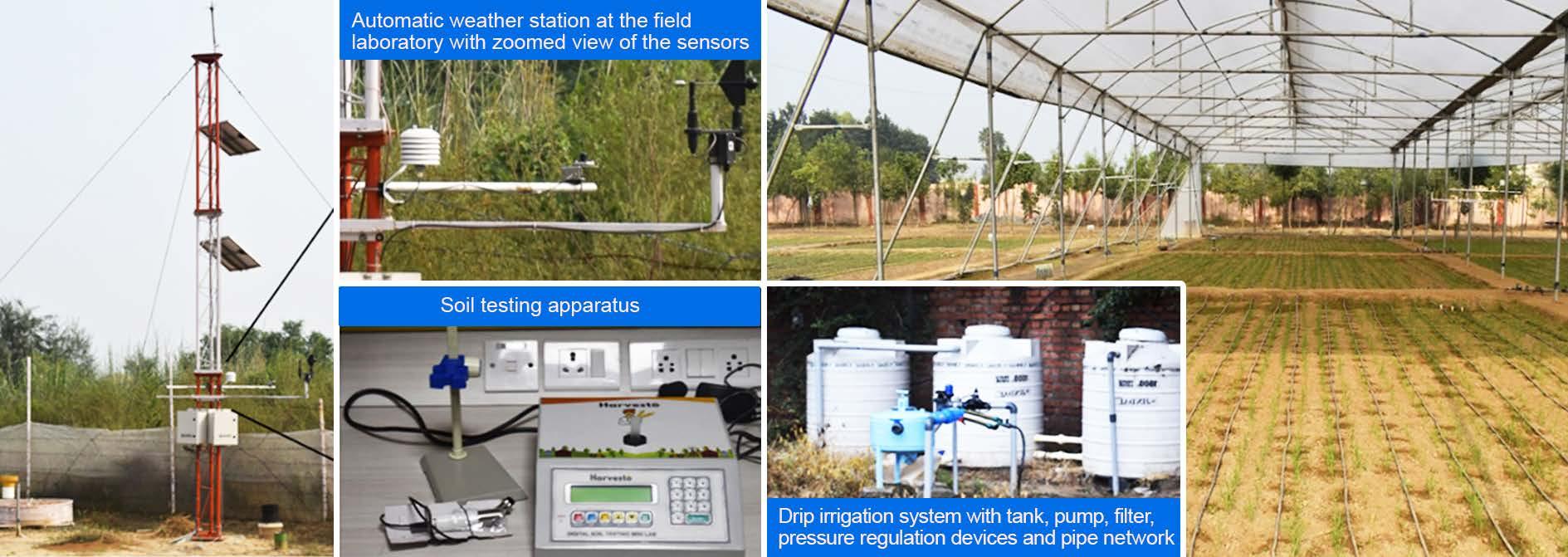
Social Sector Internship - Student Projects
The School of Management and Entrepreneurship students undergo a rigorous 8-week on-site internship immersion in rural and non-urban ecosystems, working with the local indigenous communities to ameliorate social enterprise challenges or create growth models for the social sector.
The opportunity to work on real-life projects provides students the context, empathy, and expertise to make decisions, keeping in mind the triple bottom line involving people, planet, and profit, irrespective of the professional or entrepreneurial roles they assume in the future. These opportunities generate new forms of knowledge where disciplinary barriers are dissolved; the divides between the scholar and the practitioner, the thinker and the doer, are overcome, and concrete societal benefits accompany the academic benefits of research.
Some examples of these projects are:
Suryansh and Pawan Kumar worked with HCL Foundation on their project called Samuday, which is their flagship rural development program, that intends to develop a sustainable, scalable, and replicable model – a source code for economic and social development of rural areas in partnership with state government, local communities, NGOs, knowledge institutions, and allied partners. The program is about designing and implementing optimal interventions across agriculture, education, health, environment, livelihood, and WASH (Water, Sanitation & Hygiene).
Chockalingam R worked with Shri. A.M.M. Murugappa Chettiar Research Centre (MCRC) on assessing Biochar’s impact on paddy crop yield, fertilizer reduction, climate change, and cost benefit for farmers. This study provided valuable insights into the economic benefits of biochar usage, such as reducing fertilizer costs and improving soil health and environmental conditions. It shed light on how biochar contributes to mitigating climate change.
RESEARCH
Revolutionizing Agriculture with Emerging Tech
Dr. Gopal Das Singhal, Associate Professor, Department of Civil Engineering; Associate Head, School of Engineering, and Dr. Hitesh Upreti, Assistant Professor, Department of Civil Engineering, are using emerging satellite and drone remote sensing techniques, data analysis, and IoT to research water management and agricultural monitoring to attempt to alleviate agricultural deficiency.
Besides using the European Space Agency’s Sentinel 1 and 2 and NASA’s Landsat satellites to study soil moisture and crop health, the research team uses their own Surveybot drone. The high-end drone, with a payload capacity of 10 kg, is equipped with thermal, multispectral, and hyperspectral cameras. The data collected is analyzed through Pix4D, a photogrammetry and drone mapping software, to provide inputs to monitor parameters like water requirement and crop health. The massive data sets are analyzed using machine learning tools to observe crop water requirements and predict crop yield.
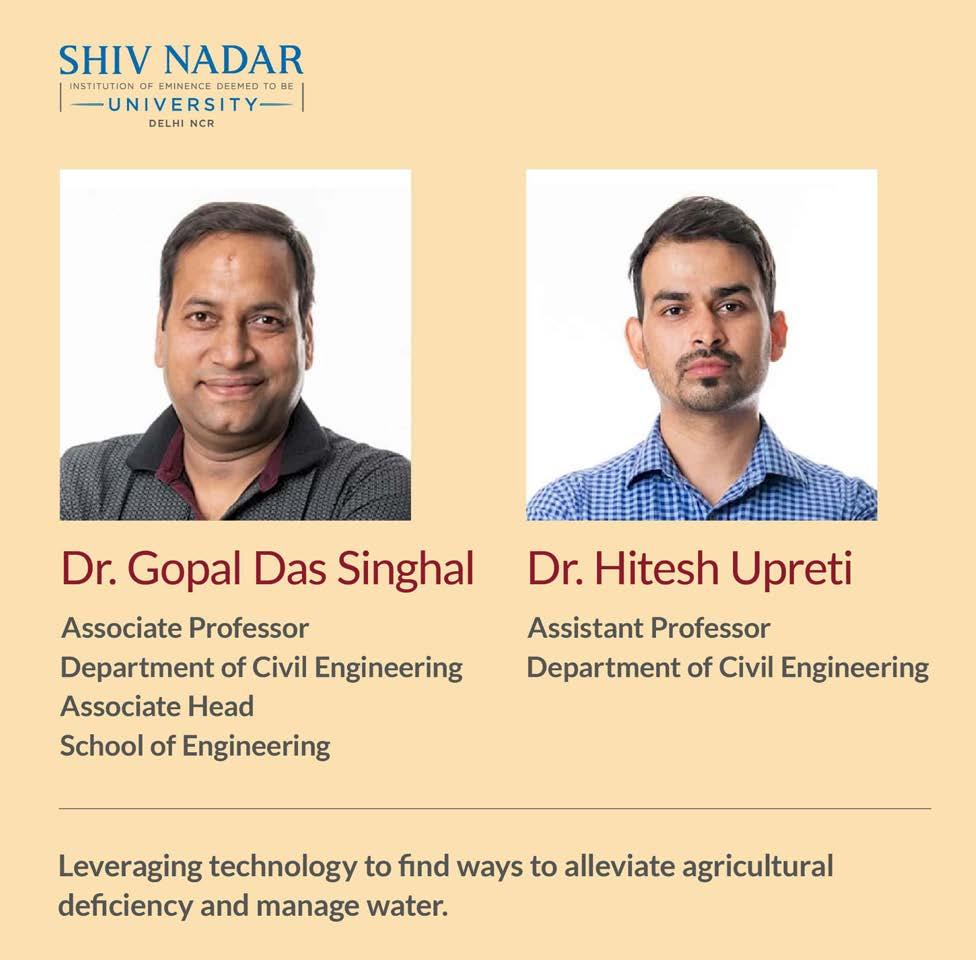
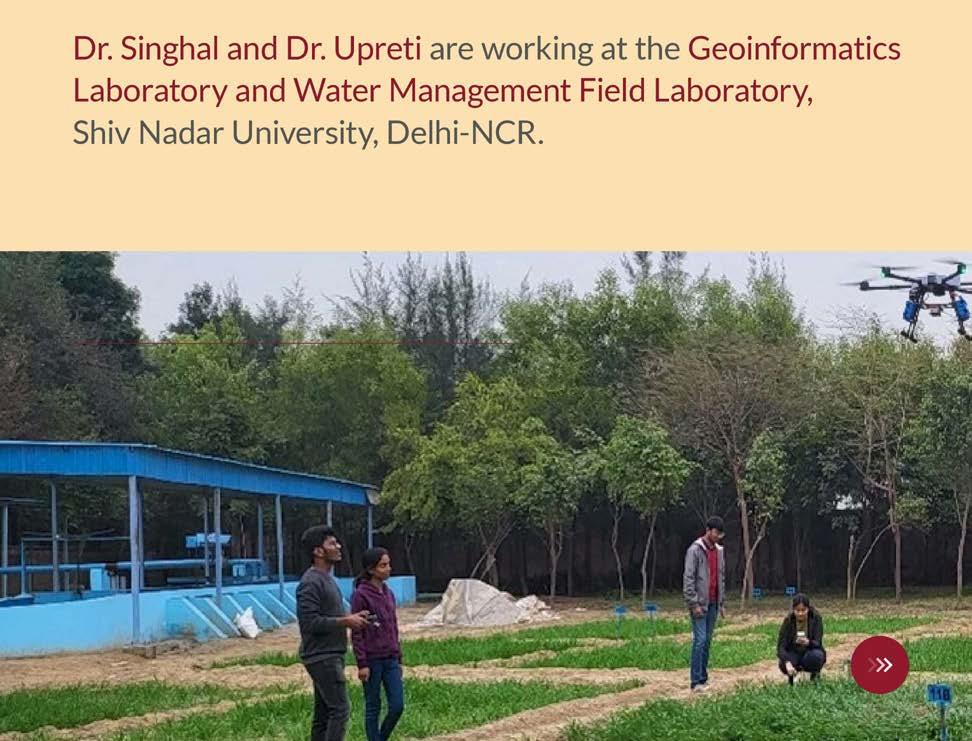
Post-growth agrifood systems: Towards an emancipatory politics
Dr. Rajeswari Raina and Ph.D. scholar Rishabh Kachroo from the Department of International Relations and Governance Studies, School of Humanities and Social Sciences, through their research, are exploring how hunger can be addressed using a post-growth approach.
In a paper titled ‘Post-growth agrifood systems: Towards an emancipatory politics,’ published in the reputed journal Review of International Studies, they show how critical international relations theory dovetails with the principles of post-growth thinking to learn from local agroecological alternatives, which foreground caring, sharing, ecological, and democratic values.
The analysis provides opportunities for emancipatory politics where one can revisit given theories in socially and politically accepted frameworks.
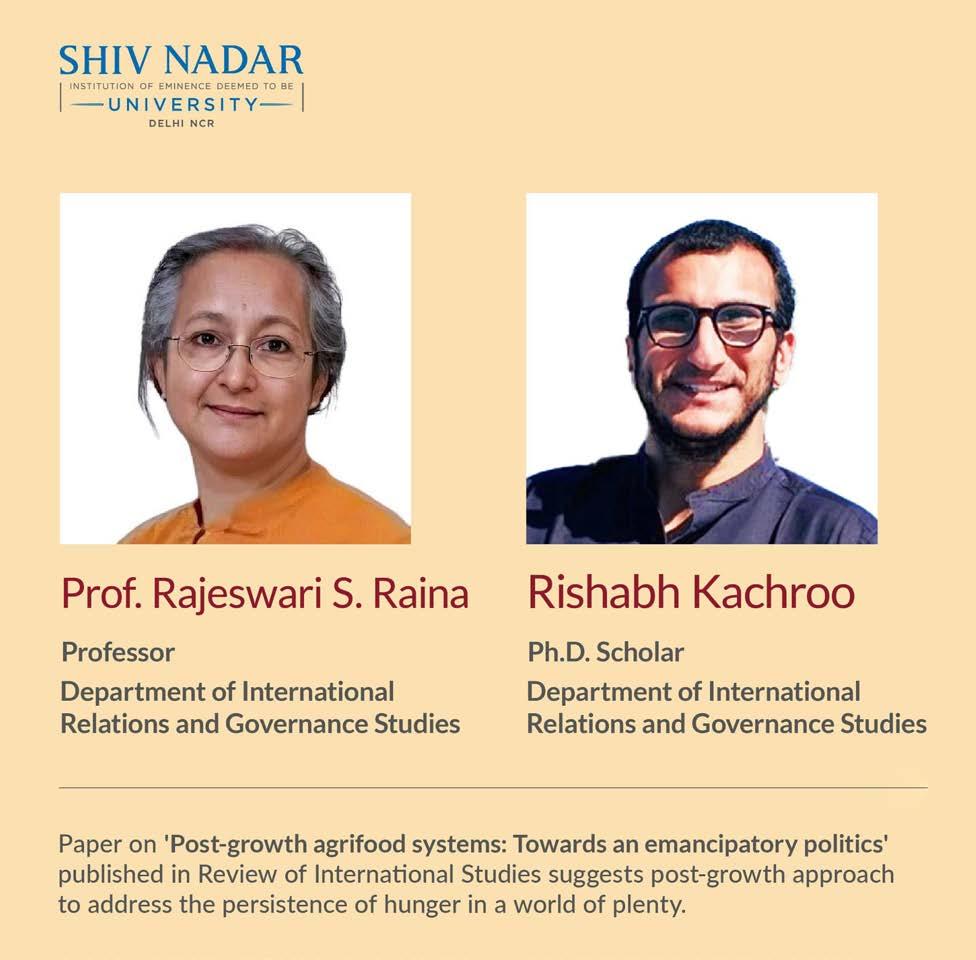
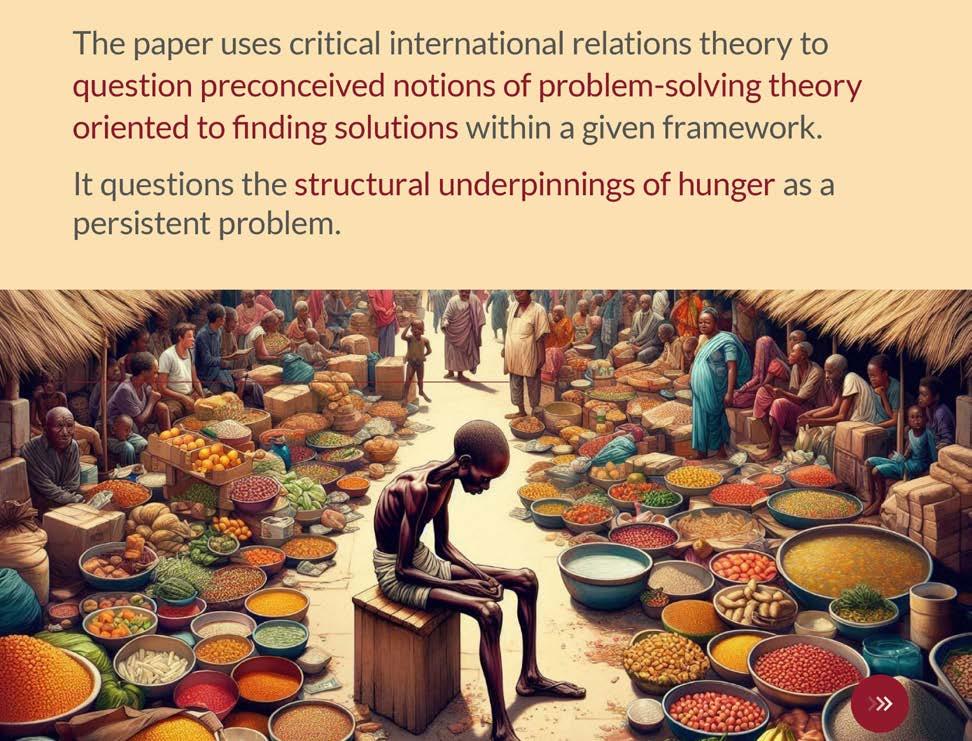
Leading the path in Food Waste to Fuel research
Dr. Sanjeev Yadav, Associate Professor and Head, Department of Chemical Engineering, is working to convert waste into bioenergy and biomaterials, working on the scientific frontiers to provide a shared blueprint under the UN Sustainable Development Goals. Working to convert food waste into hydrogen under the Food Waste to Fuel (F2F), the research uses a thermochemical process to degrade waste into hydrogen and further biodiesel, with the remaining ash as organic fertilizer.
Dr. Yadav has attracted external grants of more than Rs 2 crore, including funds from the Science and Engineering Research Board (SERB) under the Young Scientist Scheme, the Department of Science and Technology under its Fund for Improvement of Science and Technology Infrastructure (FIST) scheme, and from the Council of Science and Technology, Uttar Pradesh.

Under the Food Waste to Fuel (F2F) research initiative, two Ph.D. students have graduated, and two are currently working. The research has also gained traction from the Food Waste Index Report released by the United Nations Environment Program (UNEP) in 2024. The study reveals that globally, 1.05 billion tonnes of food waste are generated. This research is also an encouraging initiative in the backdrop of the government’s National Green Hydrogen Mission (NGHM).
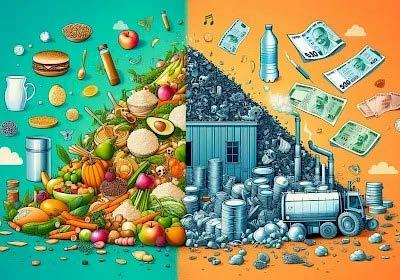
Crop water stress index and its sensitivity to meteorological parameters and canopy temperature
The adverse impacts of climate change and the disparity between water availability and demand in agriculture necessitate the development of waterefficient irrigation schedules. The empirically derived crop water stress index (CWSI) is a popular tool for detecting water stress in crops and scheduling water-efficient irrigation regimes. However, the sensitivity of the empirical CWSI to the input parameters, i.e., air temperature (Ta), canopy temperature (Tc), and relative humidity (RH), is rarely studied. This study was conducted on wheat crops in the Uttar Pradesh province of India. Four irrigation scheduling strategies/treatments are used to study CWSI and its sensitivity to TC and meteorological parameters (Ta and RH). Two irrigation scheduling strategies correspond to drip irrigation, and the remaining two correspond to flood irrigation. The study results show that the water stress, as reflected by the CWSI values, was significantly lower for drip irrigation treatments than for flood irrigation treatments.
Yadav, Aditi, Hitesh Upreti, and Gopal Das Singhal. “Crop water stress index and its sensitivity to meteorological parameters and canopy temperature.” Theoretical and Applied Climatology 155, no. 4 (2024): 2903-2915.
Applications of drones in precision agriculture: the future of intelligent and sustainable farming
Agricultural drones/unmanned aerial vehicles are aerial devices that can be employed in precision agriculture (PA). This technology not only helps the farmers increase their farm productivity but also helps in timely and convenient crop monitoring in the fields. Drones facilitate seed sowing, soil condition monitoring, irrigation scheduling, assessing crop conditions for their health, estimating stress, and livestock management. This chapter provides insight into the applications of drones in PA and is helpful to planners and decision-makers in agricultural research.
Tyagi, Ritvik, and Prem Chandra Pandey. “Applications of drones in precision agriculture: future of smart and sustainable farming.” In Remote Sensing in Precision Agriculture, pp. 429-453. Academic Press, 2024.
Case Studies – selected for their positive societal and environmental impact.
Dr. Bikramjit Rishi, a Professor of Marketing, has been working on Case Studies with a specific focus on agriculture, natural resources, and climate change. His recent examples include:
1. Center for Sustainable Agriculture (CSA): Expanding a Business Model – the case study was submitted to the prestigious 2024 Financial Times Responsible Business Education Award Case Competition. The Financial Times case competition spotlights business school education that contributes to a fairer, greener world.
2. Charcoal Briquette: Turning an invasive water hyacinth into an opportunity – the case study explores ‘how communities around Laguna De Bay, Philippines, are transforming the invasive water hyacinth into sustainable charcoal briquettes, creating economic opportunities while helping to preserve the environment.’
One can dive into this innovative solution and discover how a challenge can become a sustainable win-win for both people and nature. The case study reflects on many SDG goals, such as 2, 3, 6, 8, and 13.
Man-Made
Evolution’: Peaceful Atoms, Circulatory Knowledge, and Atomic Agriculture in India in a special issue on atomic agriculture
Dr. Kapil Patil, Assistant Professor, Department of International Relations and Governance Studies, published an article in a special issue of Agricultural History Journal on atomic agriculture, arguing that the use of radiation techniques in agriculture held great promise in postcolonial India’s quest to put agriculture on a “scientific basis.” Unpacking its epistemic debates and the dynamics of international technical assistance, this article contends that the pursuit of atomic agriculture constituted a dominant sociotechnical imaginary among Indian elites to modernize the country’s traditional agrarian system.
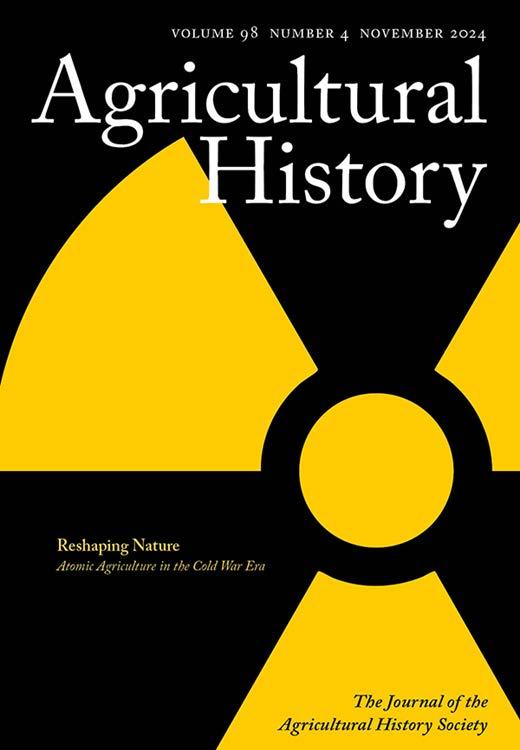
Community-led
institutional innovation: Groundwater sharing, values and relationships in India’s rainfed farming systems
It is generally acknowledged that action is more successful when informed by knowledge than when undertaken in ignorance. But whose knowledge and knowledge of what support successful action? And, if
these are important questions, then so are questions about what counts as success and for whom. We explore these questions as they play out in efforts to address diminishing water resources in India, especially in the Indian state of Andhra Pradesh, where they are articulated both by those who know how to survive with rainfed …
Raina, Rajeswari S., and Helen Longino. “Community-led institutional innovation: Groundwater sharing, values and relationships in India’s rainfed farming systems.” Studies in History and Philosophy of Science 112 (2025): 102-111
Conversations on Campus
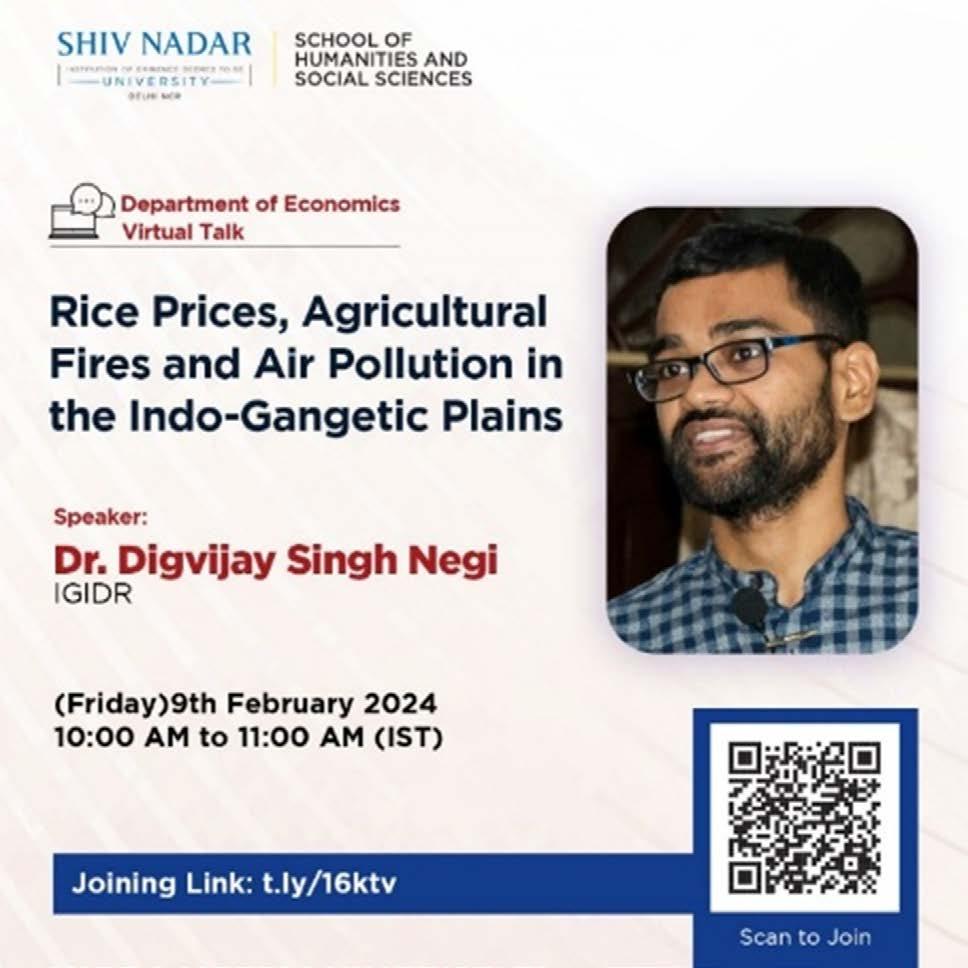
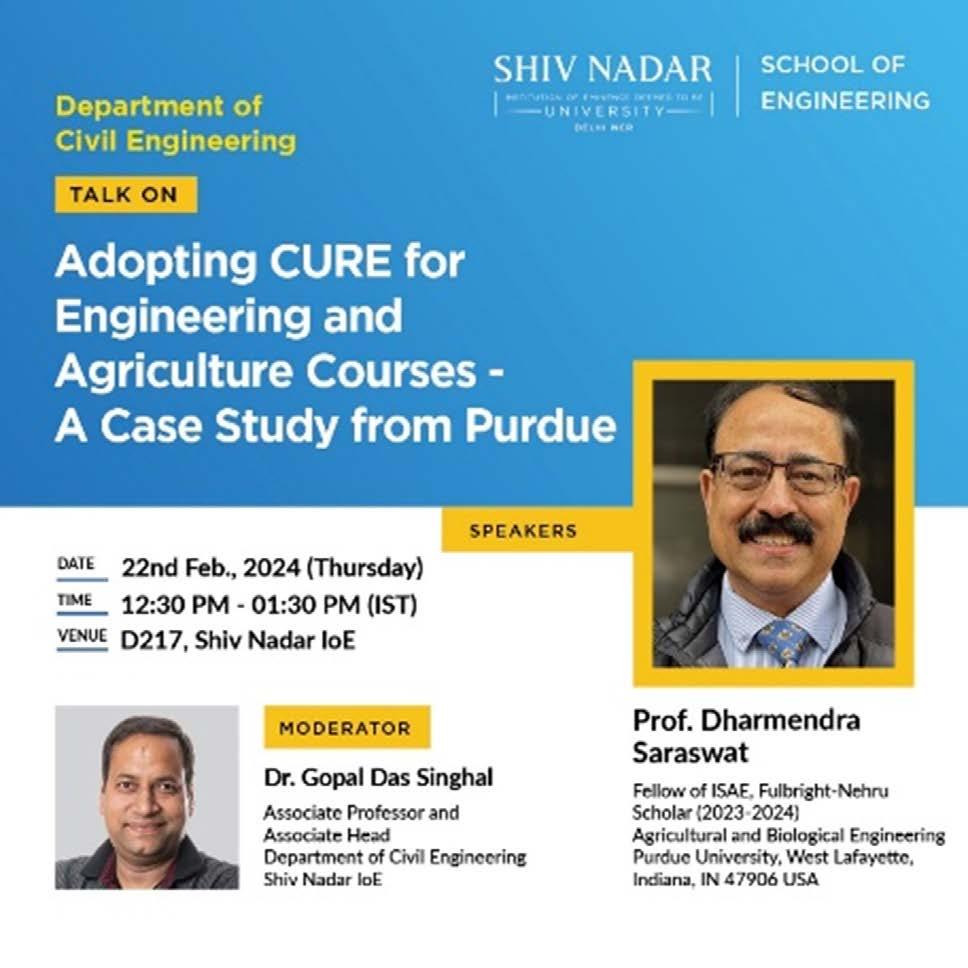

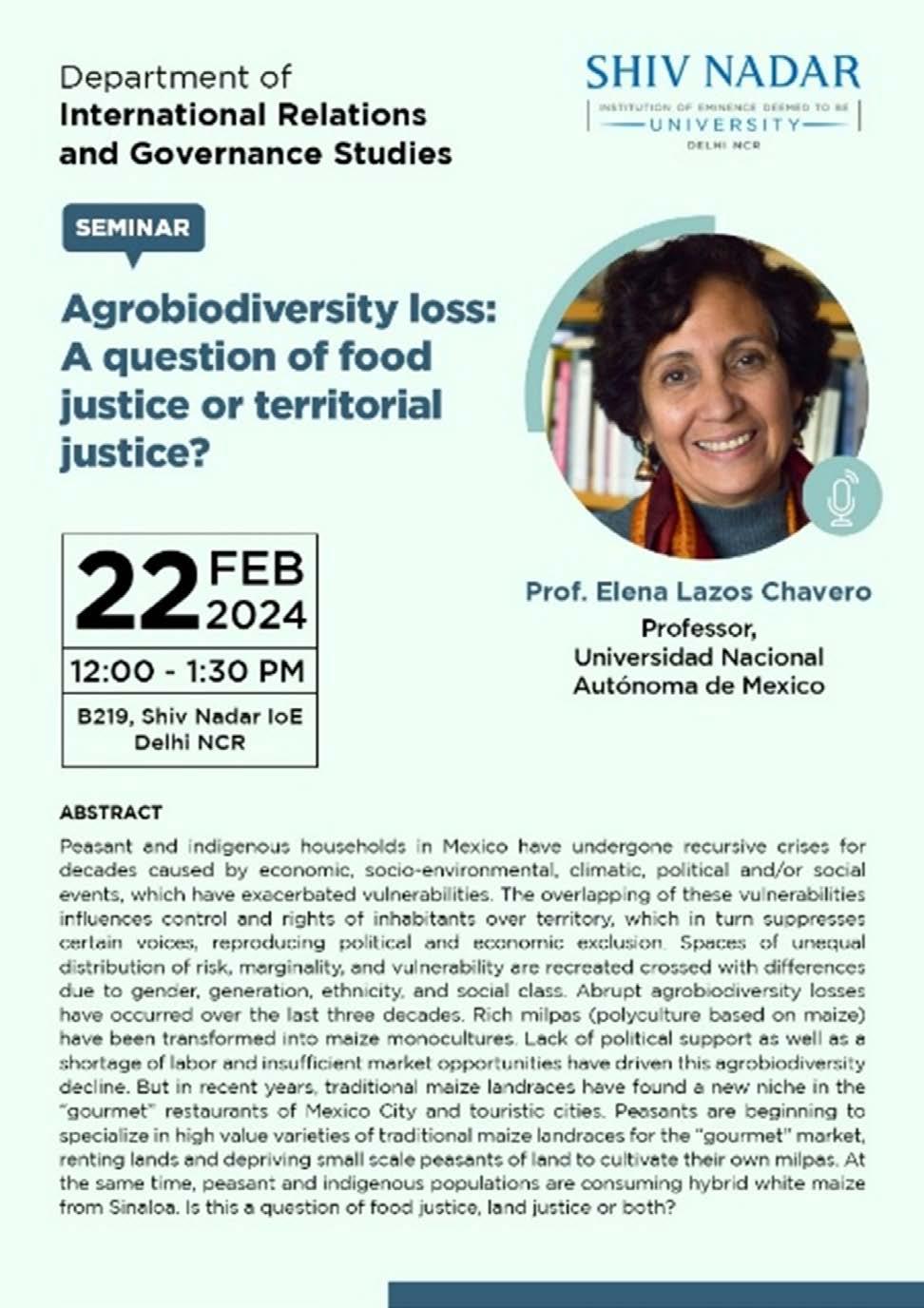
Partnership between Shiv Nadar University and ENSFEA-University of Toulouse, France
The Department of International Relations and Governance Studies at Shiv Nadar University and ENSFEA-University of Toulouse, France, are partnering to spearhead discussions and research on Sustainability Transitions in Agri-food Systems. The partnership has been inspired by how India and France, as two nation-states and dynamic economies, handle knowledge and policy for the much-needed sustainability transitions in their respective agri-food systems. As the first step, a three-day seminar was jointly hosted by both Universities on Sustainability Transitions in Agri-food Systems - Evidence and Options for Action in India and France from March 18- 21, 2024. To foster cooperation between Indian and French agricultural scientists and reinforce their capacity to support transitions towards sustainable food systems.
The seminar stressed the fact that the existence of agroecological research programs, public policies, and social movements in both countries calls for a strengthening of this theme in the cooperation of
the two countries; echoing many initiatives under development on the Franco-Indian axis, which can be expected to have a more substantial impact: creation of the Franco-Indian-Pacific campus dedicated to health (nutritional and environmental risks of diseases), Indian interest in One-Health initiatives (e.g. Prezode -Preventing Zoonosis Disease Emergence- an international activity supported by the French Ministry of Foreign Affairs.
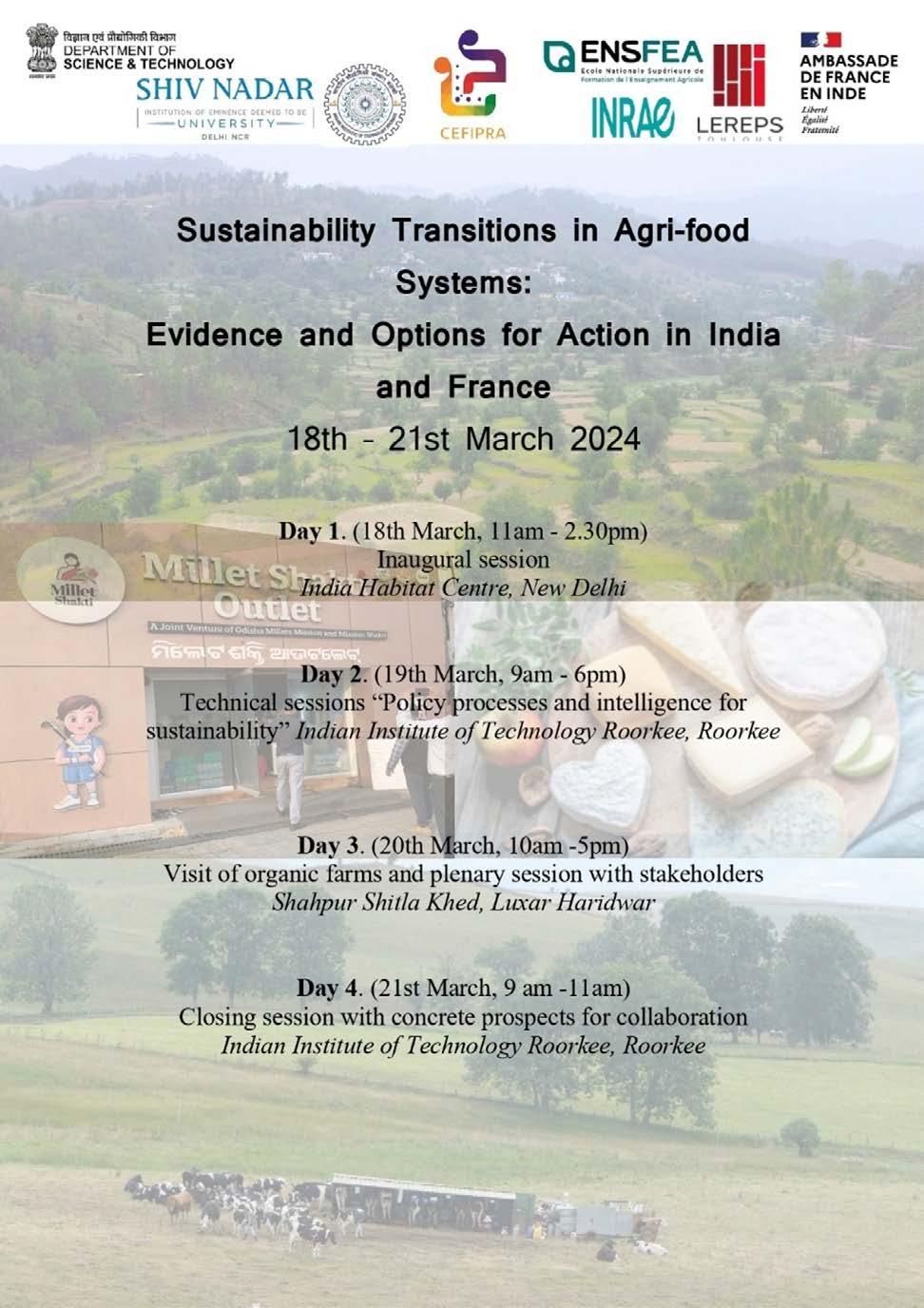
Dedicated Labs on Campus to deliver cutting-edge research
Water Management Field Laboratory
To address the critical issues of food & water security nexus, water management, and the impact of climate change on water availability, the Department of Civil Engineering established the Water Management Field Laboratory in April 2021.
The Ministry of Water Resources and the Ministry of Agriculture & Farmers’ Welfare, Government of India, have marked these research themes as areas of national importance. These areas are also aligned with the focus of the government’s national missions on more crops per drop (increasing
water use efficiency), har khet ko pani (increasing the cultivated area under irrigation), and Goal 4 (Improving water use efficiency by 20%) and Goal 5 (promotion of basin level integrated water resources management) of the National Water Mission.
The Government of India and the university co-funded the laboratory to serve as a state-ofthe-art research facility. It has an extensive crop experimentation facility equipped with a drip irrigation system and research equipment for monitoring crops and soil parameters.
Two broad research areas the lab focuses on are:
• Agriculture Water Management
• River hydraulics.
Doctoral students and undergraduate researchers are conducting their research at this lab.
One of the large projects hosted in the lab is “Optimizing Irrigation and Nutrient Management in Wheat Production by Integrating Advanced Technologies to Save Water and Enhance Agricultural Productivity Under Variable Climate.”
The research aims to evaluate grain yield, analyze soil moisture extraction patterns, and identify strategies that minimize water use while maximizing crop yield. A key aspect of the study is quantifying deep percolation in local farmers’ fields, which leads to low water use efficiency. By understanding how water is lost, the research seeks to inform modifications in irrigation practices to reduce these losses. This research integrates advanced technologies such as remote sensing, machine learning, and UAVs to enhance precision agriculture.
The following research scholars are working on this project with different objectives:
1) Aditi Yadav works on ‘Assessment of crop water stress index and its modelling for efficient irrigation water management.’
2) Ghanshyam Giri is working on ‘Assessment of soil moisture and its variability for irrigation scheduling in cropped area,’ to analyze grain yield, water productivity, soil moisture extraction patterns, and spatio-temporal variability of soil moisture using remote sensing and statistical methods while also modeling biomass and grain yield.
3) Manoj Yadav is working on ‘Monitoring crop water use and crop water stress using remote sensing in an agricultural area,’ with an objective to monitor crop water use and health, analyze spatio-temporal variations in crop water use and crop coefficient (Kc), and assess crop water stress using thermal remote sensing and meteorological data.
4) Apoorva Yadav works on ‘Evaluation of crop response to water and nutrient stress using remote sensing techniques.’ The objective is to estimate and map soil nutrient variability using UAV multispectral and hyperspectral data and to monitor crop yield by analyzing the combined effects of water and nutrient stress.
5) Adwait is working on ‘Synergetic use of machine learning and hyperspectral remote sensing for agricultural water management’. The objective is to monitor crop health at different stages using vegetation indices from remote sensing, compare indices from spectroradiometer and UAV, and predict yield using machine learning algorithms.
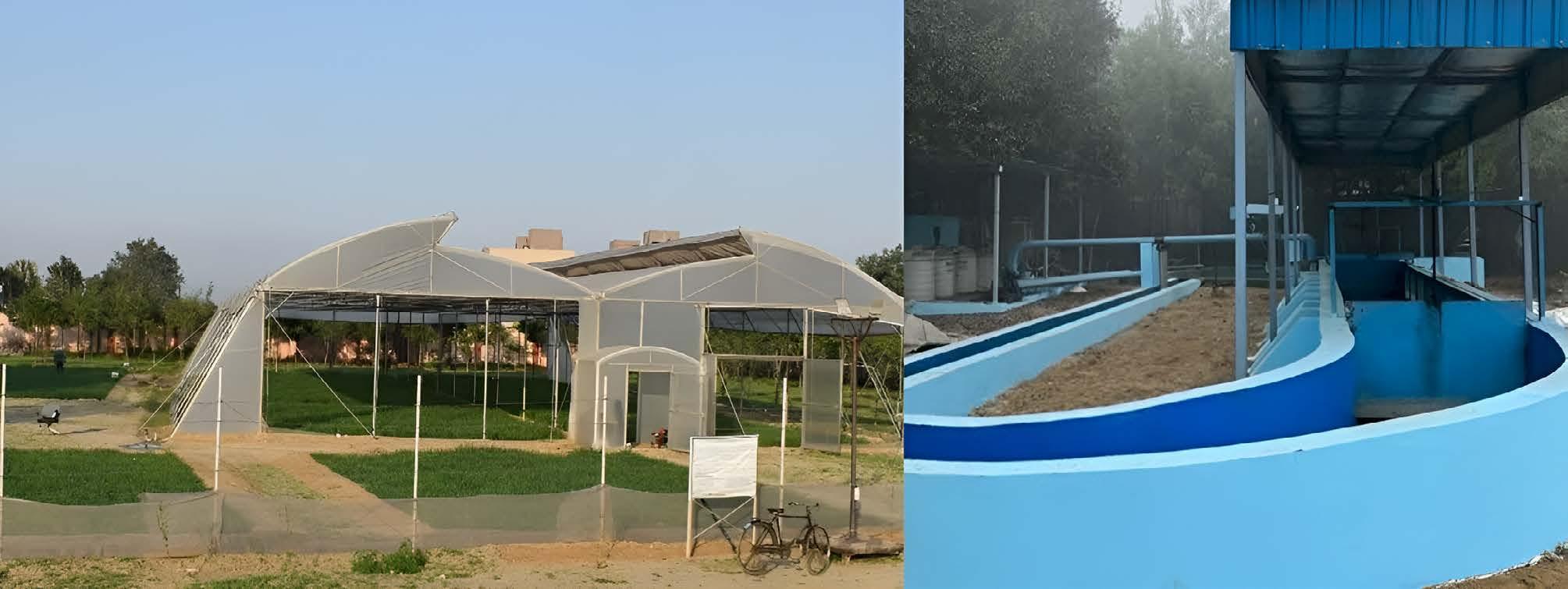

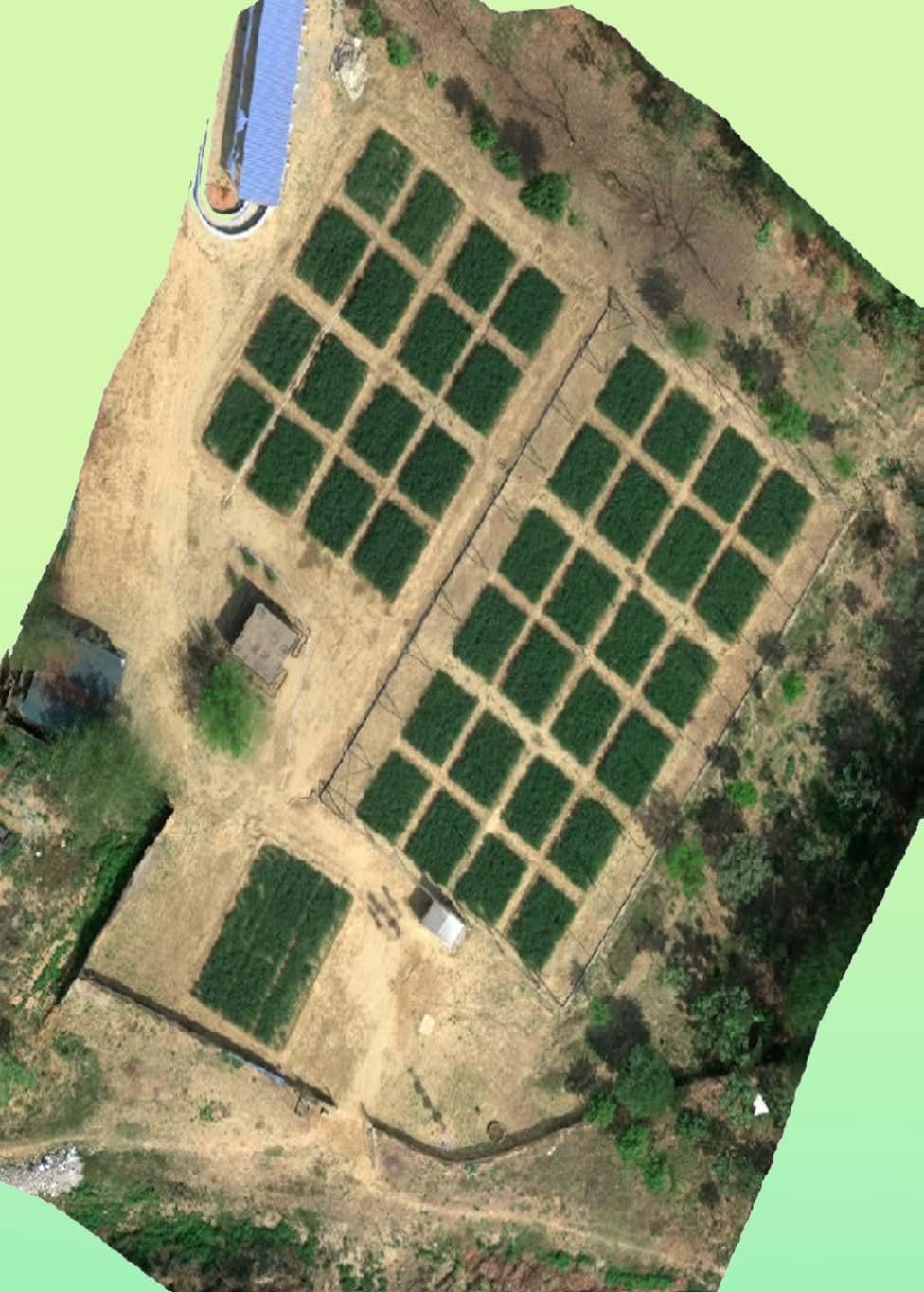
Geoinformatics Laboratory
The Geoinformatics Laboratory, hosted in the Department of Civil Engineering, includes advanced remote sensing equipment, a process ing facility, and an equipment facility used for surveying. The field lab facilities of the Water Management Field Laboratory are also utilized to collect spatial and drone remote sensing data from the agricultural field plots.
The advanced remote sensing facility includes sensors and equipment such as a drone (hexacopter), multispectral (RedEdgeP-Red, & RedEdgeP-Blue) camera system, spectroradiometer, RGB camera, plant canopy analyzer, hyperspectral camera system, L-Band radiometer, infrared thermometer (IRT), Flir Vue Pro R thermal sensor, and Differential Global Positioning System (DGPS).
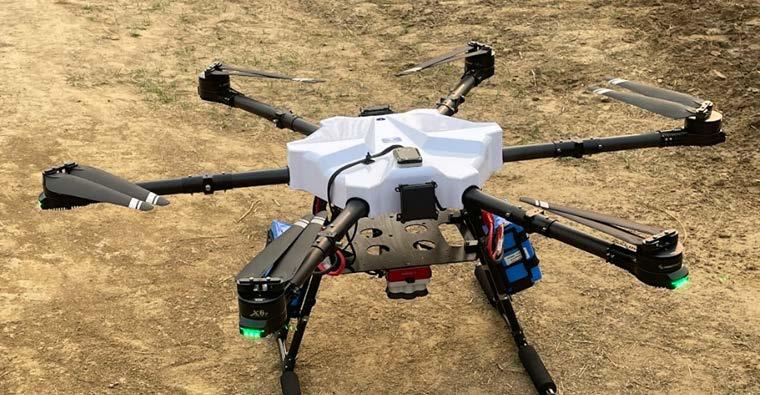
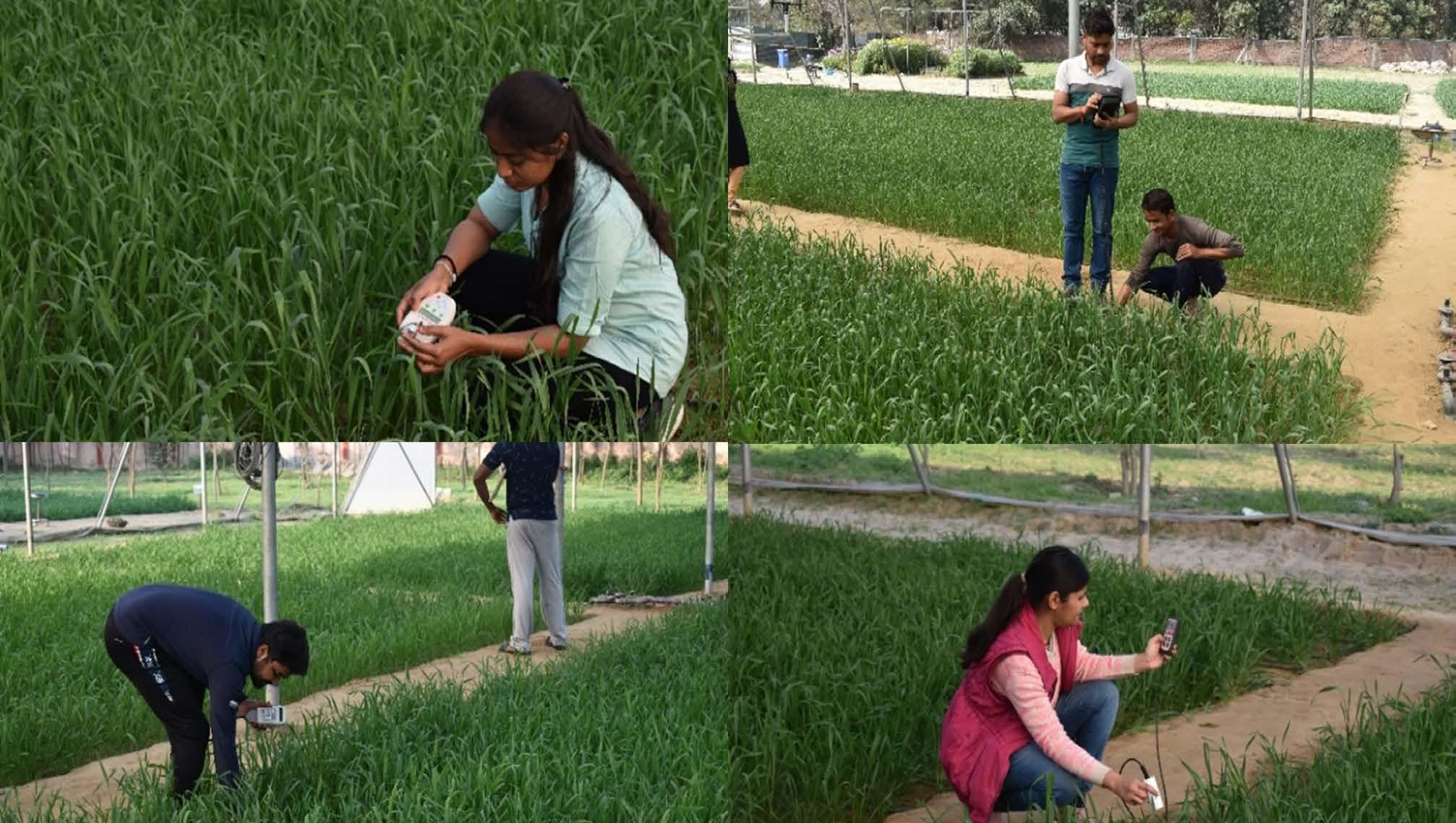
of data collection in the field lab
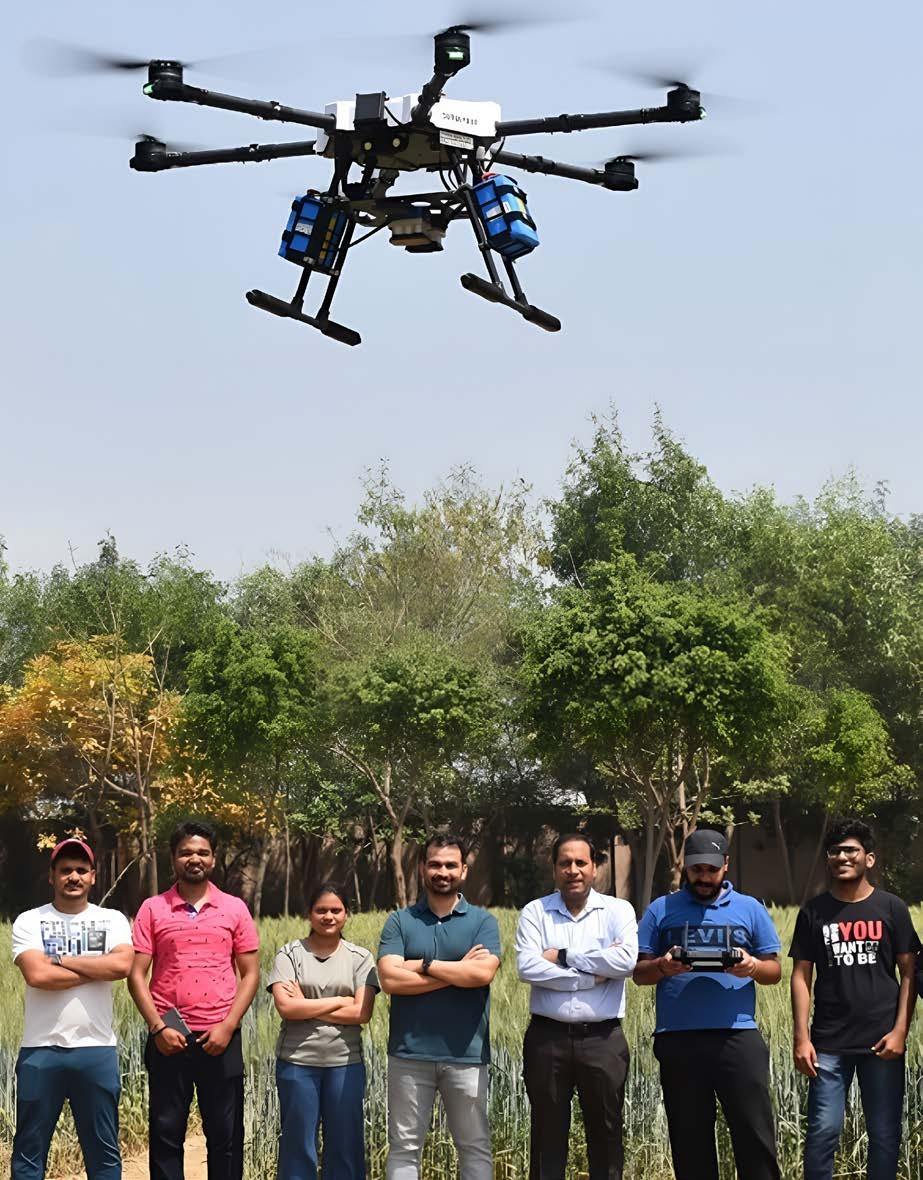
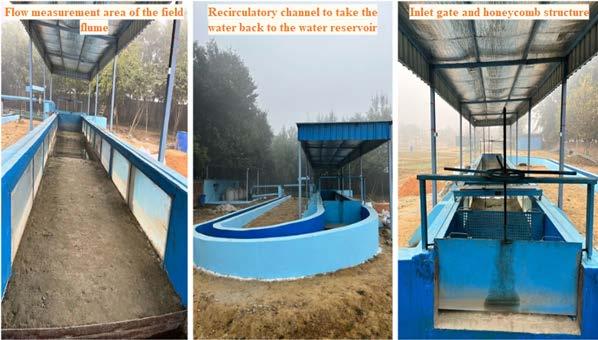
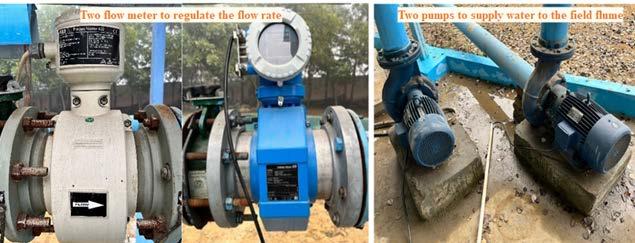
UNIVERSITY OPERATIONS
Initiatives to ensure food security on campus
The University has taken several measures to give students access to affordable and nutritious food on campus. Since this is a residential campus, careful planning and thought have enabled this access, keeping in view affordability, variety, nutrition, and taste for a diverse body of students, staff, and workers on campus.
The facilities on campus include vegetarian, nonvegetarian, vegan, and other special meals in the three dining halls, ten food kiosks around academic blocks, and vending machines for snacks, tea, and coffee. A large student activity center has various food options, a large cafeteria, and a marketplace to buy groceries and ready-made foods. Besides, the pantry on each floor in the academic area and the hostel are equipped with purified drinking water for 3000+ students/staff/residents inside the campus. The students are provided with sustainable food choices, considering the rich diversity of the student population on campus. We promote reducing food wastage on campus by catering to various scheduled menus and food options.
Free meals for students from economically weak backgrounds
The University believes in creating opportunities while supporting deserving students from economically backward areas of rural India. Every year, under the rural scholarship, the university covers the educational and living expenses and free-of-cost meals for high-potential students from economically weak backgrounds. Students from over 18 schools in rural areas are encouraged to apply for these scholarships.
Besides, the University provides food to all thirdparty staff at subsidized rates.
Campus Food Waste Tracking System
The university has a comprehensive and documented food waste tracking system to monitor and measure food waste at each level, i.e., production, handling, storage, processing, and distribution. Taking efficient measures and maintaining a daily food waste log has reduced food wastage per person. We could thus report a 1.43% decrease in food waste per person from 2022-23 to 2023-24.

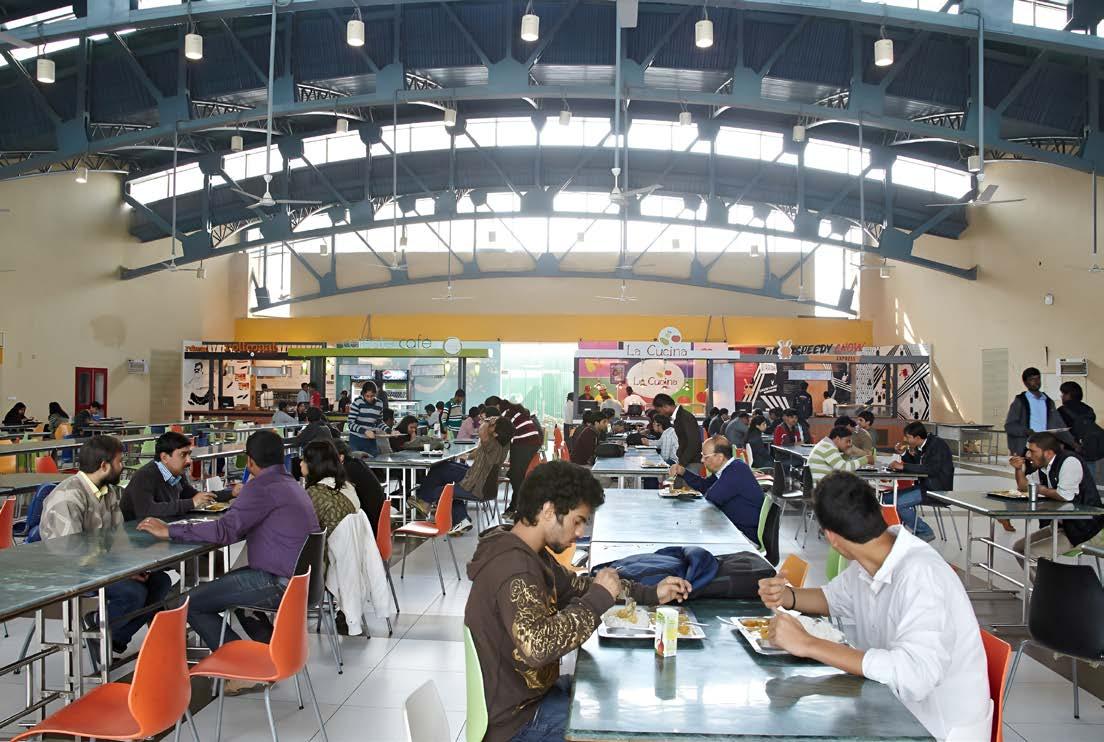

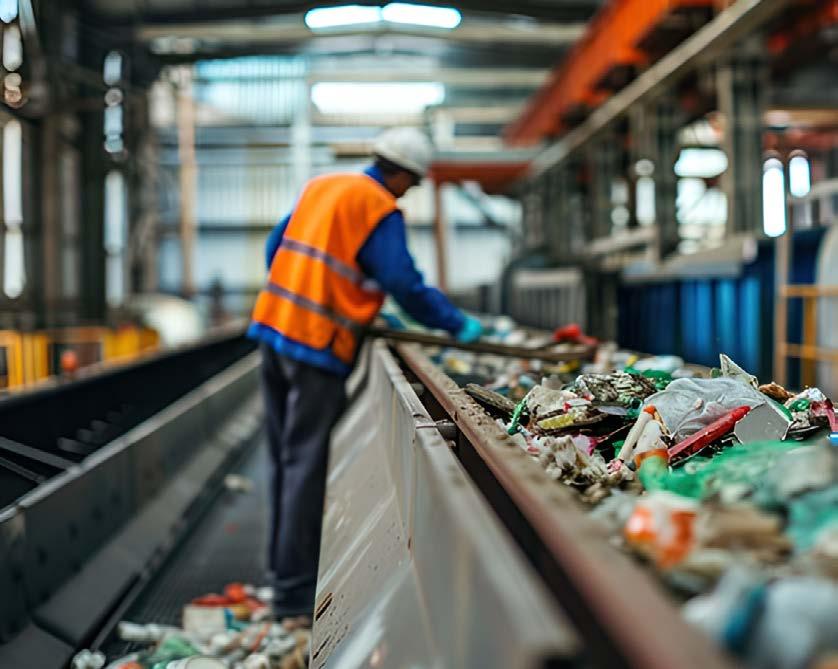
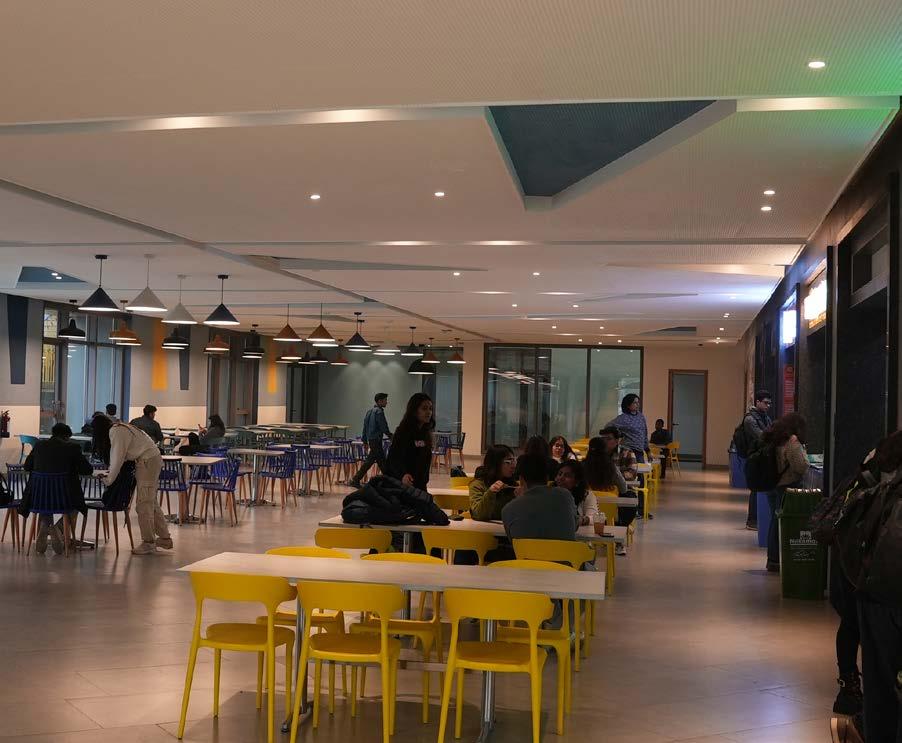

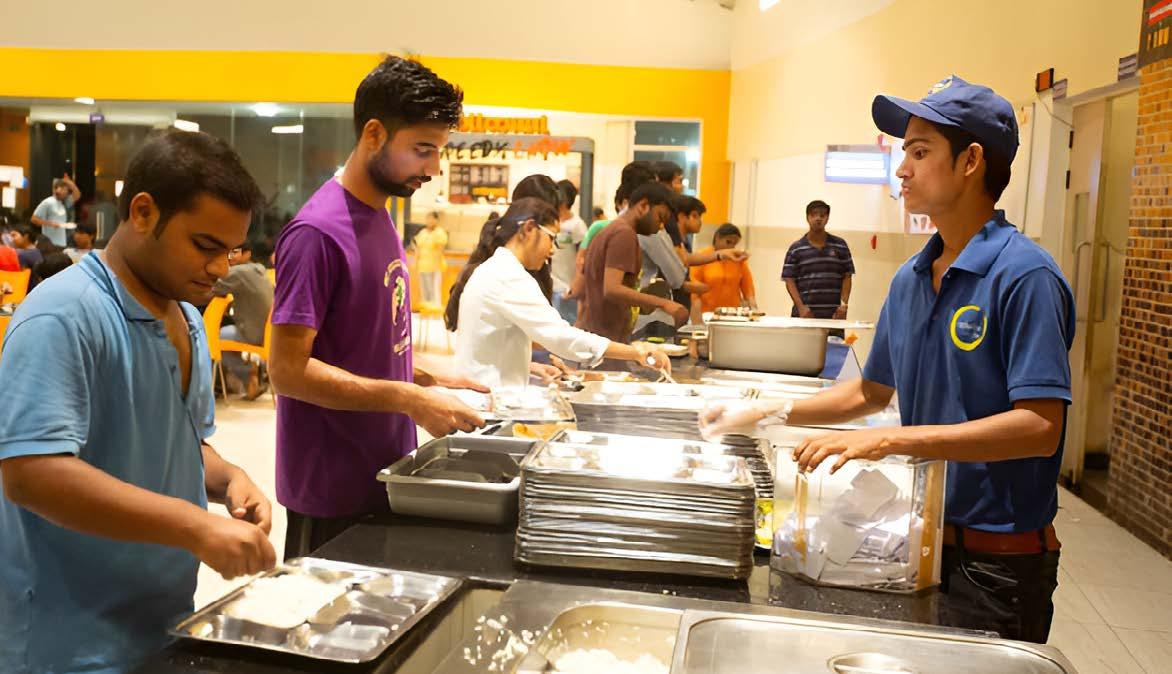
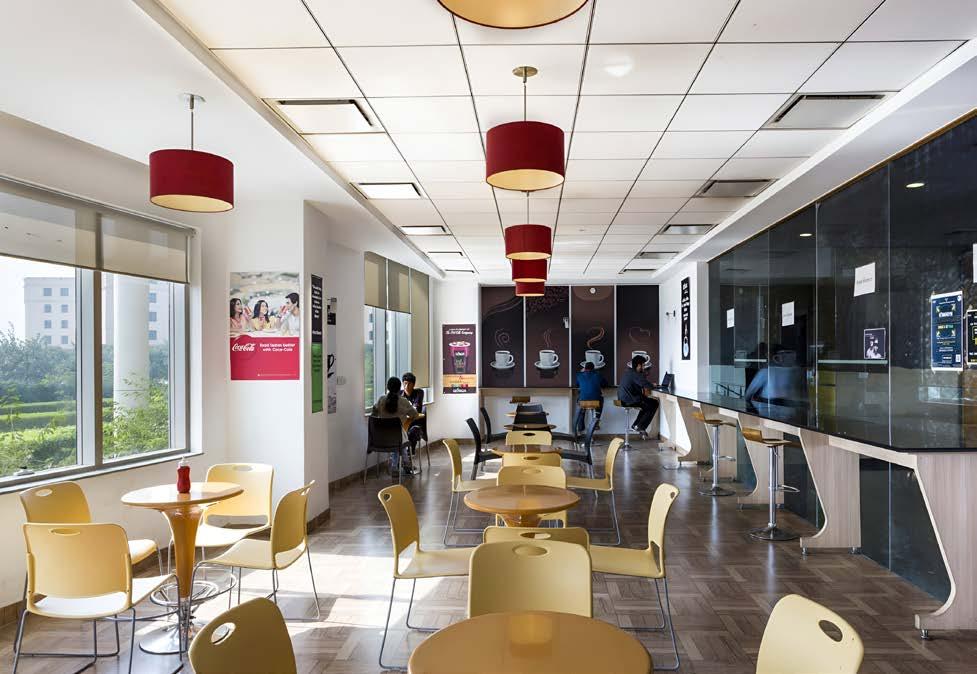

Support sustainable food choices and the local community
The university provides opportunities for local vendors to open food kiosks and vegetable shops on campus. This helps support the local community with significant economic opportunities and provides fresh and sustainable food choices from local sources to university residents.
Partner with a local organic farm
The University sources organic food from Jaivik, a local organic farm 15 miles from the campus. The produce is procured weekly and used to prepare meals served on campus. Besides, an exciting, new, community-led food initiative is in progress.
Feeding India Chapter – A studentled initiative
Shiv Nadar University has the only studentrun chapter on Feeding India. Passionate about eradicating hunger and reducing food waste on campus, the students work closely with nongovernment organizations and schools around the university to distribute meals and spread smiles.
Aabhaar Drive is conducted occasionally to share a plate of gratitude with workers on campus. The students conduct a meal-slip collection drive out of their food money and provide meals for over 350 workers on campus.
Adrika Drive – the club students collaborate with AURA, the education student society of the university, and conduct a drive in partnership with
a local non-profit organization, Aadrika. The aim is to deliver educational workshops to kids at Aadrika using fun and knowledge activities, concluding with a delicious, wholesome meal.
Sard-E-Chuski is Feeding India’s flagship event to serve hot tea to the guards on duty on cold winter nights. The drive reaches out to over 100 guards and workers on campus. The university also provides hot tea twice at night during severe winters to all staff on duty.
PARTNERSHIPS
Department of Science and Technology, Government of India, supports start-up research projects.
Dr. Gopal Das Singhal, Professor, Dr. Hitesh Upreti, Assistant Professor, and Dr. Ellora Padhi from IIT Roorkee received funding from the Department of Science and Technology to improve S&T Infrastructure (FIST). The grant runs until 2027 and includes sanctioned equipment like a recirculating tilting flume and a hyperspectral camera.
The project aims to provide solutions for developing water-efficient irrigation strategies and mapping crop water stress, which is vital for ensuring sustainable food production and water availability. Also, cascading instream storage strategies to promote self-sustained water and to mitigate flood scenarios will be developed. The project focuses on Sustainable Development Goals 2 and 6.
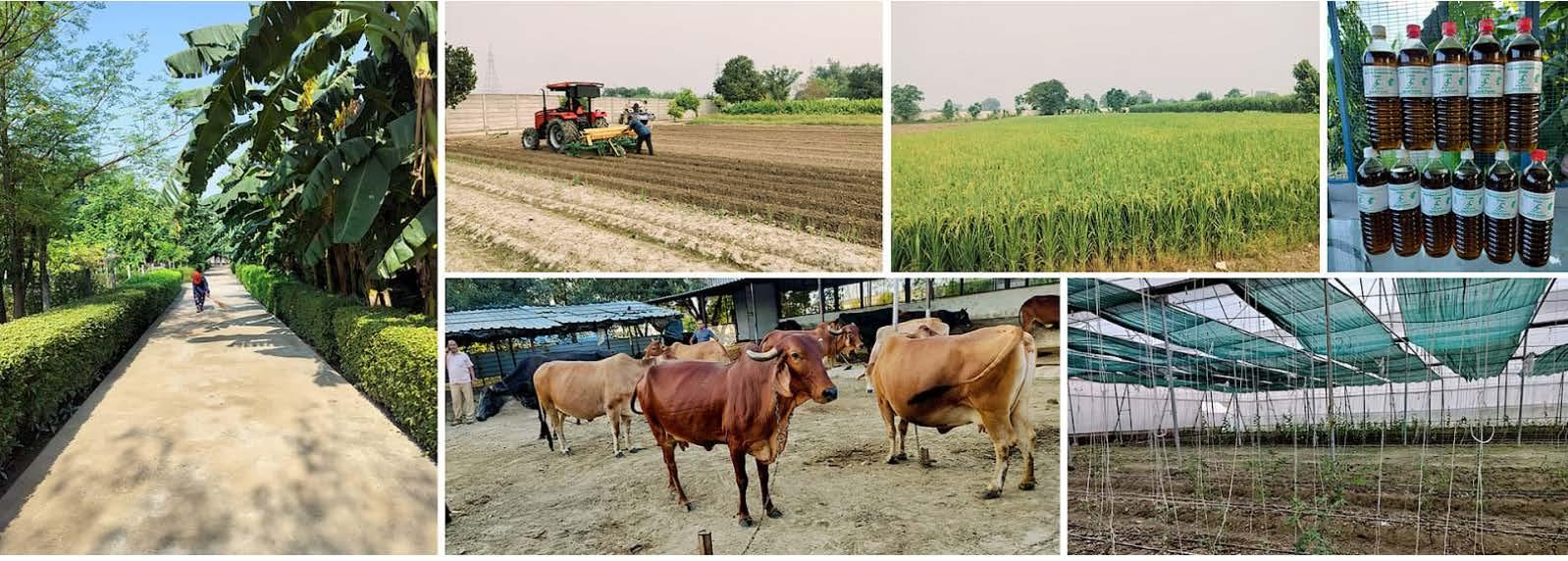

Indo-Japan collaborative research project - Development of a costeffective alternative to drone-based hyperspectral remote sensing for agricultural monitoring and yield estimation using machine learning techniques
Dr. Gopal Das Singhal, Professor, and Dr. Hitesh Upreti, Assistant Professor, Department of Civil Engineering, collaborate with Dr. Masaomi Kimura and Dr. Yutaka Matsuno, Department of Environmental Management, Faculty of Agriculture, Kindai University, Japan.
The team is working on using drone-based remote sensing data and machine learning for agricultural monitoring and water management.
Visible light induced removal of 1, 4-dioxane contaminant from drinking water using microfluidic technology: A cost and energy efficient strategy of water treatment
Dr. V. M. Rajesh, Assistant Professor, Department of Chemical Engineering, has collaborated with Dr. Subhabrata Sen, Professor, Department of Chemistry, on a project funded by Shiv Nadar University. The research aims to create an economically and energetically efficient method for eliminating the 1,4-dioxane contaminant from drinking water, utilizing visible light-induced microfluidic technology for water treatment. The project is funded under the FGIR (Faculty Grant for Interdisciplinary Research) grant until July 2025.

Building a larger community of social transformers through the field component in the master’s program in Rural Management
The master’s program on Rural Management at Shiv Nadar University is based on a unique pedagogy that provides students with an in-depth, multi-disciplinary understanding of the problems of rural India, combining innovative classroom and studio teaching with two full semesters devoted to field education, including internships with the best practitioners in rural India, nurturing their capacity to find innovative and far-reaching solutions.
Students intern with organizations that have done pioneering work over several decades in some of the most difficult management challenges facing rural India in areas of participatory water management, sustainable agriculture, rural livelihoods, women’s empowerment, drinking water, sanitation, and innovation, to name a few.
The semester is an excellent opportunity for students to learn and receive training amidst the local communities and cultures guided by our partners, Gram Vikas1 Samaj Pragati Sahayog (SPS)2 Advanced Center for Water Resources Development and Management (ACWADAM)3, and the Center for Sustainable Agriculture4 .
Partnership with the Tata Institute for Genetics and Society
Shiv Nadar University, Delhi-NCR, has signed a Memorandum of Understanding (MoU) with the Tata Institute for Genetics and Society, India, paving the way for transformative advancements in healthcare, agriculture, and education. Founded in 2017 by the Tata Trusts, TIGS is a not-for-profit research institute committed to leveraging the power of genetics and genomics for societal progress. The institute focuses
on three critical areas: Infectious Diseases, Rare Genetic Disorders, and Crop Improvement.
This collaboration aims to foster a robust exchange of expertise and resources, granting researchers access to cutting-edge facilities at both institutions. By integrating fundamental and applied research, the partnership seeks to cultivate a synergy that accelerates groundbreaking discoveries and their real-world implementation.
Women-led community kitchen –through our Community Connect program
Shiv Nadar University is located in a region called Dadri in Uttar Pradesh. Dadri is a rapidly urbanizing rural region with high socio-economic inequality and low SDG outcomes. The university is deeply committed to positively impacting the area and has assumed a central role in the Dadri Development Project, a transformative initiative convened by the Shiv Nadar Foundation (SNF), a non-governmental organization. The project aims to create a “model sustainable rural community around Shiv Nadar University.” This commitment is shared by the university leadership, staff, and students and is instilled in the core of the University’s academic mission.
Amongst many projects, the community connect program launched an innovative initiative. The “Didi Jan Rasoi” that’s aims to establish women-led community kitchens in the adjacent area around the University, mainly Dadri Block and Gautam Buddha Nagar, marking a significant step towards empowering women in our society. Implemented by ACCESS Development Services, this initiative seeks to provide economic opportunities to women from Self Help Groups and empower them to ensure that the community has access to nutritious and affordable food.
1An NGO based in Odisha works to enable rural communities to lead dignified lives. This is done by building the capabilities of village communities, strengthening community institutions, and mobilizing resources.
2One of India’s largest grass-roots initiatives working towards women’s empowerment, water, and livelihood security.
3A not-for-profit organization that aims to establish a groundwater management agenda in India with a mission to demystify groundwater science and strengthen the hydrogeological capacity of institutions working in the water sector in India.
4An organization that works with a vision to become a national institution to lead the transition of Indian agriculture to become ecologically and economically sustainable

